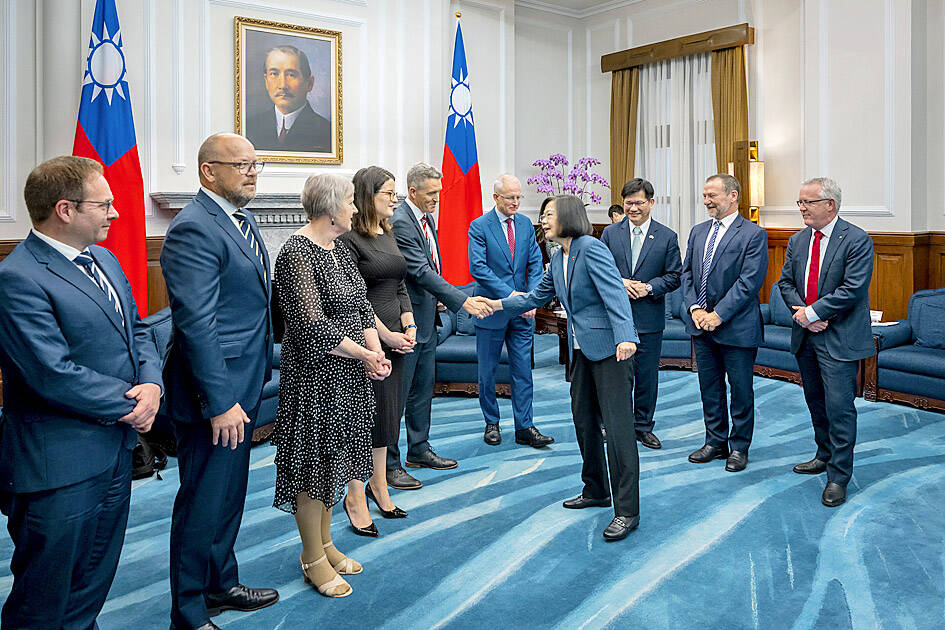Australia is committed to working with Taiwan and other Indo-Pacific partners to safeguard regional peace and stability as it serves the common interests of the people of Australia and Taiwan, Australian lawmaker Josh Wilson said yesterday.
Wilson and Australian lawmaker Paul Fletcher are leading a delegation of cross-party Australian lawmakers to Taiwan for a visit until tomorrow.
During a meeting with President Tsai Ing-wen (蔡英文) at the Presidential Office in Taipei yesterday, Wilson said that Australians and Taiwanese hope for a peaceful, stable, environmentally sustainable and prosperous Indo-Pacific region.

Photo: Presidential Office via AP
Working together with regional partners to build an open and inclusive Indo-Pacific region based on respectful and collaborative participation in the rules-based order is “both sensible and right,” he said.
It is also the only way to successfully tackle common challenges such as climate change, he added.
Wilson said that he believes relations between the two sides would become even stronger, especially in areas such as clean energy transition, critical minerals, education and tourism.
Wilson commended Tsai for her contributions to democracy and governance in Taiwan, and to good governance in the region through her “sustained and progressive leadership.”
Fletcher said that with the two major parties in Australia both represented, the delegation hoped to “further the warm relationship between Australia and Taiwan.”
It is Australia’s hope that it can maintain close contact with Taiwan, as it is an important economic partner and “a valued democracy” in the Indo-Pacific region, he said.
Overseas Taiwanese in his constituency recently held an event to celebrate new progress in relations between Taiwan and Australia — imports of Taiwanese pineapples, which he very much enjoyed, Fletcher said.
Tsai thanked the delegation for demonstrating Australia’s cross-party support for Taiwan, adding that the Australian parliament has long been a key force in advancing Taiwan-Australia relations.
She also extended her gratitude to Australia for underlining the importance of peace and stability in the Taiwan Strait and supporting Taiwan’s international participation.
Taiwan has become Australia’s fifth-largest trading partner and fourth-largest export market thanks to joint efforts by both sides, the president said.
Taiwan looks forward to continuing to bolster economic cooperation with Australia, which is the nation’s largest energy provider and a major source of agricultural goods, she added.
Tsai also called on the Australian government and parliament to support Taiwan’s bid to join the Comprehensive and Progressive Agreement for Trans-Pacific Partnership (CPTPP) to promote economic growth and sustainable development in the region.
Later yesterday, the delegation met with Legislative Speaker You Si-kun (游錫堃), who also called for its support for Taiwan’s bid to join the CPTPP.
Taiwan plays an important role in restructuring global supply chains in the post-COVID-19 pandemic era, You said, adding that the nation is “a trustworthy trading partner,” as it always abides by international trade regulations, and the principles of fairness and transparency.
Including Taiwan in the CPTPP would promote regional economic integration, enhance Taiwan’s economic resilience, and strengthen economic cooperation between Taiwan and Australia, he said.

AT RISK: The council reiterated that people should seriously consider the necessity of visiting China, after Beijing passed 22 guidelines to punish ‘die-hard’ separatists The Mainland Affairs Council (MAC) has since Jan. 1 last year received 65 petitions regarding Taiwanese who were interrogated or detained in China, MAC Minister Chiu Chui-cheng (邱垂正) said yesterday. Fifty-two either went missing or had their personal freedoms restricted, with some put in criminal detention, while 13 were interrogated and temporarily detained, he said in a radio interview. On June 21 last year, China announced 22 guidelines to punish “die-hard Taiwanese independence separatists,” allowing Chinese courts to try people in absentia. The guidelines are uncivilized and inhumane, allowing Beijing to seize assets and issue the death penalty, with no regard for potential

STILL COMMITTED: The US opposes any forced change to the ‘status quo’ in the Strait, but also does not seek conflict, US Secretary of State Marco Rubio said US President Donald Trump’s administration released US$5.3 billion in previously frozen foreign aid, including US$870 million in security exemptions for programs in Taiwan, a list of exemptions reviewed by Reuters showed. Trump ordered a 90-day pause on foreign aid shortly after taking office on Jan. 20, halting funding for everything from programs that fight starvation and deadly diseases to providing shelters for millions of displaced people across the globe. US Secretary of State Marco Rubio, who has said that all foreign assistance must align with Trump’s “America First” priorities, issued waivers late last month on military aid to Israel and Egypt, the

‘UNITED FRONT’ FRONTS: Barring contact with Huaqiao and Jinan universities is needed to stop China targeting Taiwanese students, the education minister said Taiwan has blacklisted two Chinese universities from conducting academic exchange programs in the nation after reports that the institutes are arms of Beijing’s United Front Work Department, Minister of Education Cheng Ying-yao (鄭英耀) said in an exclusive interview with the Chinese-language Liberty Times (the Taipei Times’ sister paper) published yesterday. China’s Huaqiao University in Xiamen and Quanzhou, as well as Jinan University in Guangzhou, which have 600 and 1,500 Taiwanese on their rolls respectively, are under direct control of the Chinese government’s political warfare branch, Cheng said, citing reports by national security officials. A comprehensive ban on Taiwanese institutions collaborating or

France’s nuclear-powered aircraft carrier and accompanying warships were in the Philippines yesterday after holding combat drills with Philippine forces in the disputed South China Sea in a show of firepower that would likely antagonize China. The Charles de Gaulle on Friday docked at Subic Bay, a former US naval base northwest of Manila, for a break after more than two months of deployment in the Indo-Pacific region. The French carrier engaged with security allies for contingency readiness and to promote regional security, including with Philippine forces, navy ships and fighter jets. They held anti-submarine warfare drills and aerial combat training on Friday in